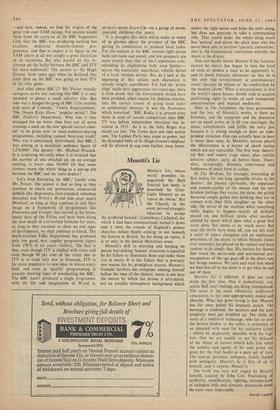Menotti's Lie
Martin's Lie, whose world premiere in- augurated the Bath
reluctant to accept the proffered honour: Canterbury Cathedral, for which it had been commissioned, turned it down and it went the rounds of England's greater churches before finally coming to rest beneath the lantern at Bristol. As for being an opera, it is so only in the special Menottian sense.
Menotti's skill in selecting and harping on potent tear-jerking 'human' situations is equalled by his failure to illuminate them and make them live in music. It is this failure that is precisely one reason for his prodigious success. Menotti's formula involves the composer abasing himself before the man of the theatre; music is not here the means by which the drama is articulated, but an amiable atmospheric background which
makes the right noises and helps the story along, but does not presume to take a commanding role. That would make the whole thing much less 'natural' and ,alarm the plain man who has never been able to swallow 'operatic convention,' that is, the fundamental convention whereby the music is the drama.
One can hardly blame Menotti if the fantastic success he enjoys has begun to turn the head of even so modest a man as he apparently is, and to breed fantastic delusions—as that he is 'the only real revolutionary in contemporary music' because he refuses to 'be conditioned by the modern idiom.' What is extraordinary is that the world's opera houses should rush to acquire performing rights in works of such transparent sensationalism and' musical mediocrity.
Only in The Telephone, the least pretentious and the best of Menotti's works, is there no falseness, and the composer and the dramatist are on equal terms; as in all true marriages, the music complements and fulfils the story just because it is strong enough to have an inde- pendent existence. One can actually bear to hear it more than once. In Menotti's serious pieces the effectiveness is a matter of shock tactics which are not repeatable. The first time, theatri- cal flair and expert stage sense, plus craftily emotive subject, carry all before them. There- after, increasingly, dramatic contrivance and feebleness of music bore or sicken, In The Medium, for example, everything at first makes for one long agreeable frisson in the theatre: the phoney spiritualist, the apparatus and mumbo-jumbo of the séance and the am- bivalent feelings they excite, the mute, the pitiful bereaved couple gulled into thinking they are in contact with their little daughter on the other side, the terror of the medium when something really begins to happen—motifs all skilfully played on, one brilliant stroke after another, abetted by music which does what a good film score does, but seems to do much more. But once the thrills have worn off, you are left with a score of abject cheapness and an unpleasant awareness of the extent to which Menotti (how- ever sincerely) has played on his subject and been content to do simply that. His instinct for themes that touch the nerve-ends and sentimental pre- occupations of the age pays off in the short run, but brings nemesis. We turn and rend him when we find that all he has done is to get what he can out of them.
Martin's Lie is different. It does not even work the. first time. One is immediately con- scious that one's feelings are being manipulated. The score is the usual offensively inoffensive concoction, in this case appropriately modal and churchy. What has gone wrong is that Menotti has for once pulled his dramatic punch. The message is confused; the neurosis and the holy simplicity have got muddled up. The child, in- mate of a mediaeval orphanage, who lies to save the heretic hidden in the cellar, is presented as so obsessed with need for his unknown father —whom he desperately identifies with the fugi- tive—that we are unable to see his defiance of the threat of torture (which kills him when the nobility and agony of his soul prove too great for the frail body) as a pure act of love. The central postulate collapses, fatally loaded with ambiguity. Martin's lie is first of all to himself, and it exposes Menotti's.
The work was very well staged by Menotti himself, assisted by John Cox. Positioning of orchestra, amplification, lighting, incorporation of cathedral bells and climactic procession down the nave were impeccable.
DAVID CAIRNS


































 Previous page
Previous page